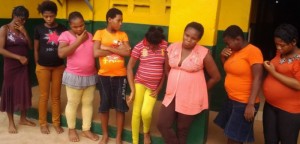THE recent discovery of another ‘baby factory’ in Lagos State is an indication that the menace is yet to be tackled. It is unfortunate that some measures put in place to curb the problem have not worked. Baby factories are facilities where pregnant young women are housed until they give birth to babies, who are later sold or offered for spurious adoption.
Last month, police operatives in the state uncovered a baby factory in the Ikotun area. Nineteen pregnant girls, aged between 15 and 28, were rescued from the facility being operated by one woman and mother of five. She escaped but two of her accomplices were nabbed.
The girls are brought to Lagos mainly from the South East for the purpose of procreating for commercial purposes. Male babies are sold for half a million naira each, while the female babies are sold for N300, 000 each.
The majority of the victims are lured to Lagos with the promise that they would be employed as domestic staff, but some walk to the baby factories themselves for economic reasons. Earlier this month, the police in Lagos reportedly rescued seven pregnant ladies, aged 13 to 27, who were on their way to a baby factory in the Ikotun/Ijegun area.
It is worrisome that this aberration has remained intractable in over the years. Since the first case of this menace was revealed in a report by the United Nations Educational, Scientific and Cultural Organisation (UNESCO) in 2006, baby factories have sprung up in many parts of the country. In the report, the organisation listed human trafficking linked to baby factories as the third commonest crime in Nigeria after drug trafficking and financial fraud. Baby factories in Nigeria are operated by well-organised, mafia-like syndicates.
Buildings disguised as clinics, maternity homes or orphanages become the homes of pregnant girls mostly compelled to live in such facilities where they are harassed, abused, threatened and subjected to different blood oaths. And once they put to bed, the babies are promptly sold while the mothers get some financial compensation.
Factors such as poverty, childlessness, greed and lack of ethical behaviours among medical professionals are reportedly responsible for the rise in baby factories. It is generally believed that baby factories are designed to curb the social stigma associated with unwanted pregnancies.
The girls involved are convinced to give up their babies for some monetary rewards. Many of the female victims are young, pregnant girls suffering from debilitating poverty and who cannot afford be single mothers.
The quest for babies by infertile couples might have fueled the rise in baby factories. In virtually all cultures in Nigeria, biological children are an integral part of a family, and couples with no child might seek to procure one or more from a baby factory.
The reluctance of childless couples to endorse adoption is a major contributor to the increasing number of baby factories. Many infertile couples can also not afford expensive reproductive procedures like in-vitro fertilisation or assisted reproduction.
We condemn the rise in baby factories and urge the government to permanently tackle the challenge. The idea of a “factory,” where babies sold is not only immoral but also criminal.
While we commend the police for apprehending the operators of the evil enterprise, we hasten to add that more work should be done to curb the social malady.
There is need for public enlightenment on the dangers of baby factories. The federal and state lawmakers must enact laws to check the ugly development. Baby factories must be outlawed and operators must be apprehended and prosecuted.
There is the need to educate young girls on how to live responsibly and prevent unwanted pregnancies. Government must also embark on enlightenment campaigns on adoption for infertile couples. Administrative and legal hiccups associated with adoptions should also be addressed

